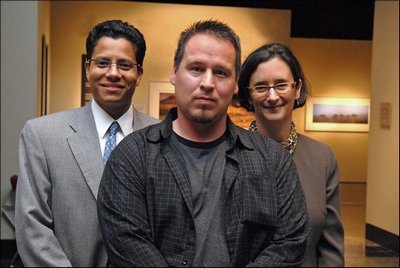February 18, 2010
UW Law Clinic’s Innocence Project helps reverse rape conviction
By Shari Ireton
UW School of Law
A 14-year nightmare ended Feb. 11 for Yakima resident Ted Bradford when a jury declared him not guilty of first-degree rape and burglary, the first case in Washington state history to win a new trial based solely on new DNA evidence. Students, faculty, staff, and volunteer attorneys with the UW School of Law’s Innocence Project Northwest (IPNW) have worked on Bradford’s case for conviction reversal for almost eight years.
On Sept. 29, 1995, a woman in Yakima was raped in her own home around 9 a.m. Although Bradford was at work from 6 a.m. until 2:30 p.m., a clerical error at the mill he worked for had him marked “absent” that day. Six months later, Bradford was arrested on an unrelated charge of indecent exposure. The victim never identified Bradford as her attacker, but a neighbor claimed to have seen Ted Bradford driving in the neighborhood sometime prior to the rape. Bradford confessed to the crime, but later he professed his innocence, saying that his confession came after nine hours of police interrogation. In 1996 Bradford was tried and convicted for rape and burglary, based on his confession.
While he served his full prison sentence of nine years, Bradford maintained his innocence. His sister-in-law contacted the IPNW, a clinical law program at the UW that works with wrongfully convicted inmates in Washington state. In 2007, Bradford’s criminal conviction was reversed by the state court of appeals based on DNA testing not available at the time of his conviction. The ruling sent the case back to Yakima County Superior Court.
In 2008, Yakima County prosecutors refiled charges against Ted Bradford, choosing his confession over the DNA evidence. While Bradford had already served his sentence, a conviction on the refiled charges would have meant Bradford would be forced to register as a sex offender. On Feb. 11, after deliberating for less than five hours, a jury found Bradford not guilty of the first-degree rape and burglary. Felix Gavi Luna ’97, an attorney with Heller Ehrman LLP and volunteer attorney with IPNW, has been Bradford’s trial attorney.
“We believed in Ted’s innocence all along,” said Luna.
Law school clinics like IPNW provide students with law-school credit while they represent real clients. Through the UW School of Law Clinical law programs’ 11 clinics, students represent clients in a wide range of contested legal proceedings, mediate cases, draft legislation, educate high school students about law, and provide legal research for budding entrepreneurs.
“Our law students provide thousands of hours of service each year, typically to individuals who would not otherwise have legal representation. I estimate the value of those services at $1.5 million per year,” said Debbie Maranville, a law professor and director of the clinical law program at UW. “Aside from providing unique hands-on law practice experiences for over 100 law students each year, our clinics have generated more than 5,500 case files in the past six years.”
Over the nine years that Bradford’s case had been with IPNW, a cadre of law students in the clinic worked on Bradford’s case, including:
- Anne Beardsley ’01, the first to correspond with Bradford and his family
- Steven Masada ’04 and Patrick Trompeter ’04 worked on Bradford’s first request for post-conviction DNA testing in 2002
- Matt Ficcaglia ’06 and Theresa Connor ’06 wrote the briefs that persuaded the Court of Appeals to order an evidentiary hearing in the case
- Mindy Ater Carr ’08 and Ashley Payne ’08 researched and edited the supplemental brief for Bradford’s hearing
- Wesley Hottot ’08 and Karin Rogers ’09 wrote the brief in opposition to the state’s motion for discretionary review
- Jon Ackley ’10, La Rond Baker ’10, Vanessa Hernandez ’09, Lilia Lim ’09, Rebecca Magee ’10, Kelly Pfundheller ’10, Roxana Rezai ’09, Todd Williams ’10, and Hania Younis ’09 worked on Bradford’s case in preparation for trial.

